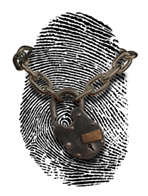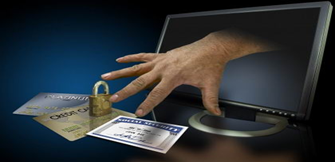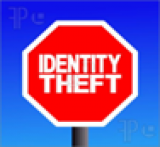Identity Theft
Identity Theft is a common term used for crimes in which someone wrongfully obtains and uses another’s personal information without their knowledge to commit fraud and other crimes.
Over 500,000 Americans become victims of identity theft annually, costing them and financial institutions approximately $750 million. Once victimized, it could take months or even years to clear one’s credit rating.
 Identity Theft Methods
Identity Theft Methods
Collecting Garbage
Thieves rummage through trash looking for paperwork containing your personal information.
Skimming
Thieves utilize special storage devices to steal your credit card numbers as you use them at locations such as ATMs and gas pumps.
Phishing
Thieves pretend to be financial institutions, companies, or government agencies, and send email or pop-up messages to get you to reveal your personal information.
Hacking
Thieves hack into your computer to steal your email or other online account information.
Stealing
Thieves steal wallets and purses; cell phones; mail, bank and credit card statements; pre-approved credit offers; new checks or tax information.
Electronic Intercept
Thieves intercept sensitive information while victims are logged onto the internet at unsecured Wi-Fi locations (airports, hotels, cafes).

Prevention Tips
- Do not carry extra credit cards, your social security card, passport, or birth certificate except when absolutely necessary.
- Do not give out personal information on the phone, through the mail or over the internet unless you know who you are dealing with. Avoid disclosing personal financial information when using public WiFi connections.
- Never click on links sent in unsolicited e-mails. Use firewalls, anti-spyware and anti-virus software to protect your home computer.
- Shred all paperwork with financial and personal information on it before throwing it in the garbage.
- Keep your personal information in a secure place at home.
- Monitor your credit report regularly.

For additional prevention tips and Identity Theft Information visit the following websites:
The National Crime Prevention Council
www.ncpc.org
Federal Trade Commission
www.ftc.gov
The National Fraud Information Center
fraud.org
Consumer Affairs
https://www.consumeraffairs.com/finance/how-to-check-for-identity-theft.html
Senior Living
Common Scams that Target the Elderly
Senior Scams: The Complete Guide
retireguide.com/guides/senior-scams/
Nursing Home Abuse:
https://nursinghomesabuse.org/nursing-home-abuse/
Victim Resources
-
Contact the Naples Police Department at 239-213-4844 to file a report. Get a copy of the report and retain it for your records.
-
Immediately change your passwords and PIN numbers.
-
Contact your creditors and let them know you are a victim. These include mortgage holders, credit card companies, telephone and utility companies, banks, etc.
-
If your bank accounts or credit card accounts have been tampered with, close them immediately and open new ones.
-
If the thief is using your Social Security numbers, report it to the Social Security Fraud Hotline.
-
If the theft of your identity is the result of stolen mail, report it to the U.S. postal inspector.
-
Contact the fraud departments of all major credit bureaus and ask for a fraud alert to be placed on your file.
Important Numbers:

Equifax: 800-525-6285
Experian: 888-397-3742
Trans Union: 800-680-7289
Social Security Fraud Hotline: 800-269-0271
U.S. Postal Inspector: 877-876-2455
